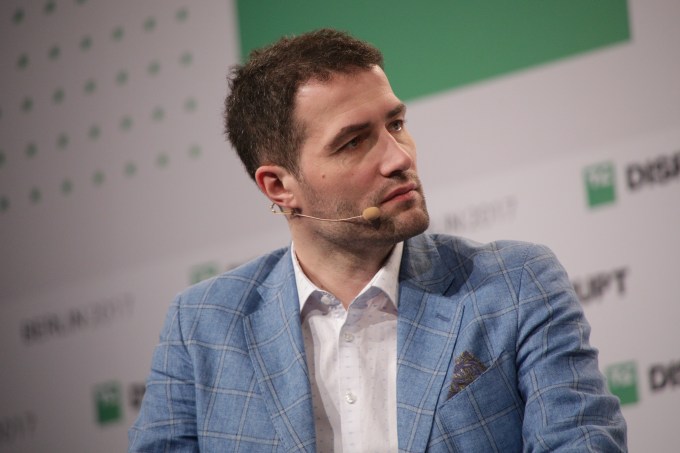Earlier today at the TechCrunch Disrupt Berlin event, founder Timo Rein took the stage alongside venture capitalists Andy McLoughlin of the early-stage firm Uncork Capital and Thomas Korte of the accelerator AngelPad.
The grouping wasn’t accidental. Rein, a former salesman who founded his CRM software company Pipedrive in 2010, launched the company in his home country of Estonia, soon after which McLoughlin and Korte persuaded him to come to San Francisco. (McLoughlin wrote him an early check as an angel investor; Korte then convinced him to pass through AngelPad’s twice yearly company-building program.)
The decision appears to have paid off for Pipedrive, which now employs 300 people in New York, Estonia, Portugal and the U.K., and which has raised roughly $31 million in funding to date. But it was a huge risk for Rein, and scaling has been far more difficult than founders with just one office might imagine.
You can click on the video at page bottom to see the full conversation, but some highlights that we found particularly instructive follow.
On foreign founders who are willing to move to Silicon Valley:
Korte said that the mere act of moving to the U.S. sets apart a lot of founders in his mind, a sentiment that McLoughlin echoed. “We now have more than 200 companies that we’ve invested in over 15 years,” said McLoughlin. “And when I look at the incidents of either immigrants or first-generation immigrants, they are far and away our star performers.”
Added McLoughlin, “I think that when you move to Silicon Valley, you’ll move mountains to make your company successful, because this is your shot. If you screw up, you have to go home.”
Certainly, the move wasn’t easy for Rein, who stayed in the Bay Area for four years after graduating from AngelPad, which resulted in four years of 5 a.m. phone calls with employees who remained in Estonia, located in the Eastern European Time Zone. (That’s 10 hours ahead.)
It was undoubtedly lonely at times, too, with Rein describing “finding Europeans” in the Bay Area as “a good feeling,” explaining that it was easier for him to feel that they were “real.” Said Rein with a laugh, a “lot of [people] in California, they’re way too friendly with you and you don’t know if they’re being [genuine or otherwise].”
It isn’t just the founders’ bravery that the venture capitalists said they admired. Korte commented on the “fiscal responsibility that Europeans have, because they’re so used to building their companies with relatively little money, or knowing they might not get another round.” Rein said he wasn’t sure if had a particular-type mindset because of his Estonian heritage, but he noted that questions Europeans tend to ask include, ” ‘How is this a business,’ rather than, ‘Let’s see if something flies.’ In the U.S., it’s ‘What could the next big dream be?’ ”
On the potential downsides of deciding to head to the U.S.:
Both Korte and McLoughlin said they strongly encourage the European founders they want to fund to move to the U.S. McLoughlin teasingly called VCs “inherently very lazy.” But he also said that — no joke — Uncork won’t fund entrepreneurs who aren’t willing to pull up stakes and move. (Korte won’t either.) Explained McLoughlin, “We want companies to be incorporated in Delaware [for legal reasons] but we also want them to be close. Most of the value that early-stage VCs provide is hands-on help with hiring and strategy and pricing and go-to-market and everything else, and it’s hard to do that if you aren’t in the same room.
“We maybe have the scar tissue, too, of companies that didn’t move and it’s been much harder for them to accelerate,” continued McLoughlin.
Rein clearly thinks spending time in California — before later relocating the company’s U.S. headquarters to time-zone friendlier New York — was well worth it.
But Rein has also managed to resist raising the kind of money that Silicon Valley VCs like to put to work and that can sometimes either drown a company or else force them to seek out far larger outcomes for their investors.
Korte pointed, for example, to one of his portfolio startups, DroneDeploy, a four-year-old drone mapping and analytics platform that has also raised $31 million to date. The company was founded by three South African founders who were living in the U.K. when Korte found them, and he says they moved to the U.S. because they “felt the best engineering they could find was at these [local] companies.” That said, Korte noted that even with similar funding pictures, DroneDeploy has “nowhere near the revenue or customers” that Pipedrive currently has, calling it a “trade-off” to be in more expensive (and often more demanding) Silicon Valley.

Other reasons not to move, said the panelists, include operating in a geography that has come to produce specialists in a certain kind of tech, like fintech and AI in the U.K. For many technologies, said McLoughlin, Silicon Valley is “probably the best place in the world” to live. For others, he acknowledged, “You can come and spend a lot of money and spin your wheels and actually be worse off than if you’d stayed in your home market and executed well there.”
Why expanding is more complicated than it looks — no matter which geography a founder chooses:
Asked how Rein manages four offices in different countries and maintains any semblance of a company culture, he was candid, saying it’s incredibly hard. “You almost have to look away from cultures and to what makes a human being a great person and a great [professional] and make that almost your guiding light as you hire.” It’s a challenge to pull off, largely because “people come from a national culture, and they tend to think [their culture] is the default, like, ‘This is how Brits look at the world, and it’s probably more right than [how someone else] looks at it.’ And Germans have that. Estonians have that,” he continued.
“The question is how you remove that default-level thinking,” Rein said, but it’s “not easy, especially when you look around the world in terms of what’s going on right now — the sensitivity in terms of what’s wrong and what’s not wrong in different societies.”
Managing far-flung offices is a pain operationally, too, noted McLoughlin, who’d previously co-founded the collaboration software company Huddle, which operated out of more than one office before selling in late summer by a private equity firm.
Pointing to Rein, he noted that it’s “easy to look at what these guys are doing and their four offices and [the fact that] they’re doing so well and conclude, ‘Oh, it must be really f_cking easy to have a multi-office situation.’ ” But having two offices isn’t twice as hard, said McLoughlin. Instead, he offered, “It’s like 10 times as hard, especially if you throw in a 10-hour time difference and then you add a third and fourth office. The amount of time and money and emotion that you put into your communications infrastructure is insane.”
One last challenge — and hardly the least of them — is catering to customers in different markets. Indeed, on stage today, Rein announced that Pipedrive just opened its second data center in Germany, years after opening its first in Chicago.
The reason: “People have differences toward everything” depending on where they live, he said.
Germany in particular is “amazingly sensitive toward data,” he continued, saying Pipedrive had “worked around” the issue as long as it could, but now it can far more easily serve Europe. That’s true from a compliance standpoint but also because it can now reassure its customers that it takes seriously their concerns about how their data is treated, said Rein.
More below.
(Pictured above, from left to right: Rein, McLoughlin, and Korte.)
